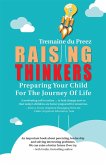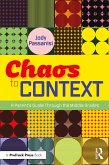Mel Levine
A Mind at a Time (eBook, ePUB)
America's Top Learning Expert Shows How Every Child Can Succeed
15,81 €
inkl. MwSt.
Sofort per Download lieferbar

0 °P sammeln
Mel Levine
A Mind at a Time (eBook, ePUB)
America's Top Learning Expert Shows How Every Child Can Succeed
- Format: ePub
- Merkliste
- Auf die Merkliste
- Bewerten Bewerten
- Teilen
- Produkt teilen
- Produkterinnerung
- Produkterinnerung

Bitte loggen Sie sich zunächst in Ihr Kundenkonto ein oder registrieren Sie sich bei
bücher.de, um das eBook-Abo tolino select nutzen zu können.
Hier können Sie sich einloggen
Hier können Sie sich einloggen
Sie sind bereits eingeloggt. Klicken Sie auf 2. tolino select Abo, um fortzufahren.

Bitte loggen Sie sich zunächst in Ihr Kundenkonto ein oder registrieren Sie sich bei bücher.de, um das eBook-Abo tolino select nutzen zu können.
Different minds learn differently, writes Dr. Mel Levine, one of the best-known education experts and pediatricians in America today. And that's a problem for many children, because most schools still cling to a one-size-fits-all education philosophy. As a result, these children struggle because their learning patterns don't fit the schools they are in. In A Mind at a Time, Dr. Levine shows parents and others who care for children how to identify these individual learning patterns.
- Geräte: eReader
- mit Kopierschutz
- eBook Hilfe
- Größe: 1.67MB
- FamilySharing(5)
Andere Kunden interessierten sich auch für
![The Unmotivated Child (eBook, ePUB) The Unmotivated Child (eBook, ePUB)]() Natalie RathvonThe Unmotivated Child (eBook, ePUB)13,84 €
Natalie RathvonThe Unmotivated Child (eBook, ePUB)13,84 €![Raising Thinkers (eBook, ePUB) Raising Thinkers (eBook, ePUB)]() Tremaine du PreezRaising Thinkers (eBook, ePUB)9,95 €
Tremaine du PreezRaising Thinkers (eBook, ePUB)9,95 €![From Magical Child to Magical Teen (eBook, ePUB) From Magical Child to Magical Teen (eBook, ePUB)]() Joseph Chilton PearceFrom Magical Child to Magical Teen (eBook, ePUB)14,83 €
Joseph Chilton PearceFrom Magical Child to Magical Teen (eBook, ePUB)14,83 €![The Art of Teaching Children (eBook, ePUB) The Art of Teaching Children (eBook, ePUB)]() Phillip DoneThe Art of Teaching Children (eBook, ePUB)14,83 €
Phillip DoneThe Art of Teaching Children (eBook, ePUB)14,83 €![Wild and Free Book Club (eBook, ePUB) Wild and Free Book Club (eBook, ePUB)]() Ainsley ArmentWild and Free Book Club (eBook, ePUB)15,65 €
Ainsley ArmentWild and Free Book Club (eBook, ePUB)15,65 €![Extraordinary Parenting (eBook, ePUB) Extraordinary Parenting (eBook, ePUB)]() Eloise RickmanExtraordinary Parenting (eBook, ePUB)16,95 €
Eloise RickmanExtraordinary Parenting (eBook, ePUB)16,95 €![Chaos to Context (eBook, ePUB) Chaos to Context (eBook, ePUB)]() Jody PassanisiChaos to Context (eBook, ePUB)18,95 €
Jody PassanisiChaos to Context (eBook, ePUB)18,95 €-
-
-
Different minds learn differently, writes Dr. Mel Levine, one of the best-known education experts and pediatricians in America today. And that's a problem for many children, because most schools still cling to a one-size-fits-all education philosophy. As a result, these children struggle because their learning patterns don't fit the schools they are in. In A Mind at a Time, Dr. Levine shows parents and others who care for children how to identify these individual learning patterns.
Dieser Download kann aus rechtlichen Gründen nur mit Rechnungsadresse in A, B, BG, CZ, D, DK, EW, E, FIN, F, GR, HR, H, I, LT, L, LR, NL, PL, P, R, S, SLO, SK ausgeliefert werden.
Produktdetails
- Produktdetails
- Verlag: Simon + Schuster LLC
- Seitenzahl: 352
- Erscheinungstermin: 4. April 2002
- Englisch
- ISBN-13: 9780743217682
- Artikelnr.: 37840031
- Verlag: Simon + Schuster LLC
- Seitenzahl: 352
- Erscheinungstermin: 4. April 2002
- Englisch
- ISBN-13: 9780743217682
- Artikelnr.: 37840031
- Herstellerkennzeichnung Die Herstellerinformationen sind derzeit nicht verfügbar.
Mel Levine, M.D., is professor of pediatrics at the University of North Carolina Medical School and director of its Clinical Center for the Study of Development and Learning. He is the founder and cochairman of All Kinds of Minds, a nonprofit institute for the understanding of differences in learning, and the author of two previous national best-selling books, A Mind at a Time and The Myth of Laziness. He and his wife, Bambi, live on Sanctuary Farm in North Carolina.
Contents
Acknowledgments
1 A Mind at a Time: Introduction
A Mind's Possibilities
A Pediatric Perspective
2 The Ways of Learning
How Learning Works
Eight Systems
Neurodevelopmental Profiles
How a Mind's Profile Comes to Be
How Lifestyles May Affect Learning Styles
Splitting Rather Than Lumping
The Early Detection of Dysfunction
Some Adult Implications
3 Conducting a Mind: Our Attention Control System
The Mental Energy Controls
The Intake Controls
The Output Controls
The Impacts of the Attention Controls
Minds over Time: Keeping a Watchful Eye on the Attention Controls as Children Age
Practical Considerations
4 Remembering to Learn and Learning to Remember: Our Memory System
Short-term Memory
Active Working Memory
Long-term Memory
A Few More Memory Differences
The Outlook
Minds over Time: Keeping a Watchful Eye on Memory as Children Age
Practical Considerations
5 Ways with Words: Our Language System
The Different Languages That Make Up Language
Language Levels
The Special Challenge of Language Production
Language and Its Ambassadorial Functions
Minds over Time: Keeping a Watchful Eye (or Ear) on Language as Children Age
Practical Considerations
6 Making Arrangements: Our Spatial and Sequential Ordering Systems
Sequential Ordering
Spatial Ordering
Spatial Versus Sequential Ordering: Which Would You Rather Be Good At?
Minds over Time: Keeping a Watchful Eye on Sequential and Spatial Ordering as Children Age
Practical Considerations
7 Mind over Muscle: Our Motor System
Forms of Motor Function
Minds over Time: Keeping a Watchful Eye on Motor Function as Children Age
Practical Considerations
8 Some Peeks at a Mind's Peaks: Our Higher Thinking System
Conceptual Thinking
Problem-Solving Thinking
Critical Thinking
Rule-Guided Thinking
Creative Thinking
pardThe Role of Intuitive Thinking in Influencing All Forms of Higher Thinking
The Higher Thinking System and the Other Neurodevelopmental Systems
Minds over Time: Keeping a Watchful Eye on Higher Thinking as Children Age
Practical Considerations
9 Relating to Relating: Our Social Thinking System
The Big Three Social Missions
Social Functions and Dysfunctions
Are Some Kids Too Successful Socially?
Minds over Time: Keeping a Watchful Eye on Social Thinking as Children Age
Practical Considerations
10 When a Mind Falls Behind
Constructing Neurodevelopmental Profiles
Identifying the Breakdown Points
When Bad Things Happen to Good Profiles
Mining a Child's Precious Assets
Identifying and Understanding Emotional Complications
Hows Instead of Whys: Focusing on Identifying and Fixing the Breakdowns Instead of Their Causes
The Benefits and Dangers When a Child's Mind Is Tested
Roadblocks and Outcomes in Adulthood
11 Getting a Mind Realigned (but Not Redesigned)
Management by Profile
Accessing Special Services in School
The Use of Medication
Coaching and Mentoring
Raoul: An Example of a Child Who Was Managed by Profile
12 Raisin' Brain: Homes for All Kinds of Minds
Know Thy Child
Responding to Gaps
Fostering Strengths, Knacks, Talents, Intuitions, and Affinities
Trying Not to Harm
Supporting Education
Maintaining an Intellectual Life at Home
Fostering Optimism and a Positive View of the Future
13 The Right to Differ: Schools for All Kinds of Minds
Teachers: Their Roles and Their Training for Those Roles
Parents: Their Meaningful Involvement in a Child's Learning
Students: Learning About Learning and Learning About Their Kinds of Minds
Humane Schools: Protective and Nurturing Settings for All Kinds of Minds
Pathways: Greater Availability of Options for Success
The Educational Ambiance
Results
Neurodevelopmental Pluralism: A Mind at a Time as an Ethic
Helpful Readings and Other Resources
Index
Acknowledgments
1 A Mind at a Time: Introduction
A Mind's Possibilities
A Pediatric Perspective
2 The Ways of Learning
How Learning Works
Eight Systems
Neurodevelopmental Profiles
How a Mind's Profile Comes to Be
How Lifestyles May Affect Learning Styles
Splitting Rather Than Lumping
The Early Detection of Dysfunction
Some Adult Implications
3 Conducting a Mind: Our Attention Control System
The Mental Energy Controls
The Intake Controls
The Output Controls
The Impacts of the Attention Controls
Minds over Time: Keeping a Watchful Eye on the Attention Controls as Children Age
Practical Considerations
4 Remembering to Learn and Learning to Remember: Our Memory System
Short-term Memory
Active Working Memory
Long-term Memory
A Few More Memory Differences
The Outlook
Minds over Time: Keeping a Watchful Eye on Memory as Children Age
Practical Considerations
5 Ways with Words: Our Language System
The Different Languages That Make Up Language
Language Levels
The Special Challenge of Language Production
Language and Its Ambassadorial Functions
Minds over Time: Keeping a Watchful Eye (or Ear) on Language as Children Age
Practical Considerations
6 Making Arrangements: Our Spatial and Sequential Ordering Systems
Sequential Ordering
Spatial Ordering
Spatial Versus Sequential Ordering: Which Would You Rather Be Good At?
Minds over Time: Keeping a Watchful Eye on Sequential and Spatial Ordering as Children Age
Practical Considerations
7 Mind over Muscle: Our Motor System
Forms of Motor Function
Minds over Time: Keeping a Watchful Eye on Motor Function as Children Age
Practical Considerations
8 Some Peeks at a Mind's Peaks: Our Higher Thinking System
Conceptual Thinking
Problem-Solving Thinking
Critical Thinking
Rule-Guided Thinking
Creative Thinking
pardThe Role of Intuitive Thinking in Influencing All Forms of Higher Thinking
The Higher Thinking System and the Other Neurodevelopmental Systems
Minds over Time: Keeping a Watchful Eye on Higher Thinking as Children Age
Practical Considerations
9 Relating to Relating: Our Social Thinking System
The Big Three Social Missions
Social Functions and Dysfunctions
Are Some Kids Too Successful Socially?
Minds over Time: Keeping a Watchful Eye on Social Thinking as Children Age
Practical Considerations
10 When a Mind Falls Behind
Constructing Neurodevelopmental Profiles
Identifying the Breakdown Points
When Bad Things Happen to Good Profiles
Mining a Child's Precious Assets
Identifying and Understanding Emotional Complications
Hows Instead of Whys: Focusing on Identifying and Fixing the Breakdowns Instead of Their Causes
The Benefits and Dangers When a Child's Mind Is Tested
Roadblocks and Outcomes in Adulthood
11 Getting a Mind Realigned (but Not Redesigned)
Management by Profile
Accessing Special Services in School
The Use of Medication
Coaching and Mentoring
Raoul: An Example of a Child Who Was Managed by Profile
12 Raisin' Brain: Homes for All Kinds of Minds
Know Thy Child
Responding to Gaps
Fostering Strengths, Knacks, Talents, Intuitions, and Affinities
Trying Not to Harm
Supporting Education
Maintaining an Intellectual Life at Home
Fostering Optimism and a Positive View of the Future
13 The Right to Differ: Schools for All Kinds of Minds
Teachers: Their Roles and Their Training for Those Roles
Parents: Their Meaningful Involvement in a Child's Learning
Students: Learning About Learning and Learning About Their Kinds of Minds
Humane Schools: Protective and Nurturing Settings for All Kinds of Minds
Pathways: Greater Availability of Options for Success
The Educational Ambiance
Results
Neurodevelopmental Pluralism: A Mind at a Time as an Ethic
Helpful Readings and Other Resources
Index
Contents
Acknowledgments
1 A Mind at a Time: Introduction
A Mind's Possibilities
A Pediatric Perspective
2 The Ways of Learning
How Learning Works
Eight Systems
Neurodevelopmental Profiles
How a Mind's Profile Comes to Be
How Lifestyles May Affect Learning Styles
Splitting Rather Than Lumping
The Early Detection of Dysfunction
Some Adult Implications
3 Conducting a Mind: Our Attention Control System
The Mental Energy Controls
The Intake Controls
The Output Controls
The Impacts of the Attention Controls
Minds over Time: Keeping a Watchful Eye on the Attention Controls as Children Age
Practical Considerations
4 Remembering to Learn and Learning to Remember: Our Memory System
Short-term Memory
Active Working Memory
Long-term Memory
A Few More Memory Differences
The Outlook
Minds over Time: Keeping a Watchful Eye on Memory as Children Age
Practical Considerations
5 Ways with Words: Our Language System
The Different Languages That Make Up Language
Language Levels
The Special Challenge of Language Production
Language and Its Ambassadorial Functions
Minds over Time: Keeping a Watchful Eye (or Ear) on Language as Children Age
Practical Considerations
6 Making Arrangements: Our Spatial and Sequential Ordering Systems
Sequential Ordering
Spatial Ordering
Spatial Versus Sequential Ordering: Which Would You Rather Be Good At?
Minds over Time: Keeping a Watchful Eye on Sequential and Spatial Ordering as Children Age
Practical Considerations
7 Mind over Muscle: Our Motor System
Forms of Motor Function
Minds over Time: Keeping a Watchful Eye on Motor Function as Children Age
Practical Considerations
8 Some Peeks at a Mind's Peaks: Our Higher Thinking System
Conceptual Thinking
Problem-Solving Thinking
Critical Thinking
Rule-Guided Thinking
Creative Thinking
pardThe Role of Intuitive Thinking in Influencing All Forms of Higher Thinking
The Higher Thinking System and the Other Neurodevelopmental Systems
Minds over Time: Keeping a Watchful Eye on Higher Thinking as Children Age
Practical Considerations
9 Relating to Relating: Our Social Thinking System
The Big Three Social Missions
Social Functions and Dysfunctions
Are Some Kids Too Successful Socially?
Minds over Time: Keeping a Watchful Eye on Social Thinking as Children Age
Practical Considerations
10 When a Mind Falls Behind
Constructing Neurodevelopmental Profiles
Identifying the Breakdown Points
When Bad Things Happen to Good Profiles
Mining a Child's Precious Assets
Identifying and Understanding Emotional Complications
Hows Instead of Whys: Focusing on Identifying and Fixing the Breakdowns Instead of Their Causes
The Benefits and Dangers When a Child's Mind Is Tested
Roadblocks and Outcomes in Adulthood
11 Getting a Mind Realigned (but Not Redesigned)
Management by Profile
Accessing Special Services in School
The Use of Medication
Coaching and Mentoring
Raoul: An Example of a Child Who Was Managed by Profile
12 Raisin' Brain: Homes for All Kinds of Minds
Know Thy Child
Responding to Gaps
Fostering Strengths, Knacks, Talents, Intuitions, and Affinities
Trying Not to Harm
Supporting Education
Maintaining an Intellectual Life at Home
Fostering Optimism and a Positive View of the Future
13 The Right to Differ: Schools for All Kinds of Minds
Teachers: Their Roles and Their Training for Those Roles
Parents: Their Meaningful Involvement in a Child's Learning
Students: Learning About Learning and Learning About Their Kinds of Minds
Humane Schools: Protective and Nurturing Settings for All Kinds of Minds
Pathways: Greater Availability of Options for Success
The Educational Ambiance
Results
Neurodevelopmental Pluralism: A Mind at a Time as an Ethic
Helpful Readings and Other Resources
Index
Acknowledgments
1 A Mind at a Time: Introduction
A Mind's Possibilities
A Pediatric Perspective
2 The Ways of Learning
How Learning Works
Eight Systems
Neurodevelopmental Profiles
How a Mind's Profile Comes to Be
How Lifestyles May Affect Learning Styles
Splitting Rather Than Lumping
The Early Detection of Dysfunction
Some Adult Implications
3 Conducting a Mind: Our Attention Control System
The Mental Energy Controls
The Intake Controls
The Output Controls
The Impacts of the Attention Controls
Minds over Time: Keeping a Watchful Eye on the Attention Controls as Children Age
Practical Considerations
4 Remembering to Learn and Learning to Remember: Our Memory System
Short-term Memory
Active Working Memory
Long-term Memory
A Few More Memory Differences
The Outlook
Minds over Time: Keeping a Watchful Eye on Memory as Children Age
Practical Considerations
5 Ways with Words: Our Language System
The Different Languages That Make Up Language
Language Levels
The Special Challenge of Language Production
Language and Its Ambassadorial Functions
Minds over Time: Keeping a Watchful Eye (or Ear) on Language as Children Age
Practical Considerations
6 Making Arrangements: Our Spatial and Sequential Ordering Systems
Sequential Ordering
Spatial Ordering
Spatial Versus Sequential Ordering: Which Would You Rather Be Good At?
Minds over Time: Keeping a Watchful Eye on Sequential and Spatial Ordering as Children Age
Practical Considerations
7 Mind over Muscle: Our Motor System
Forms of Motor Function
Minds over Time: Keeping a Watchful Eye on Motor Function as Children Age
Practical Considerations
8 Some Peeks at a Mind's Peaks: Our Higher Thinking System
Conceptual Thinking
Problem-Solving Thinking
Critical Thinking
Rule-Guided Thinking
Creative Thinking
pardThe Role of Intuitive Thinking in Influencing All Forms of Higher Thinking
The Higher Thinking System and the Other Neurodevelopmental Systems
Minds over Time: Keeping a Watchful Eye on Higher Thinking as Children Age
Practical Considerations
9 Relating to Relating: Our Social Thinking System
The Big Three Social Missions
Social Functions and Dysfunctions
Are Some Kids Too Successful Socially?
Minds over Time: Keeping a Watchful Eye on Social Thinking as Children Age
Practical Considerations
10 When a Mind Falls Behind
Constructing Neurodevelopmental Profiles
Identifying the Breakdown Points
When Bad Things Happen to Good Profiles
Mining a Child's Precious Assets
Identifying and Understanding Emotional Complications
Hows Instead of Whys: Focusing on Identifying and Fixing the Breakdowns Instead of Their Causes
The Benefits and Dangers When a Child's Mind Is Tested
Roadblocks and Outcomes in Adulthood
11 Getting a Mind Realigned (but Not Redesigned)
Management by Profile
Accessing Special Services in School
The Use of Medication
Coaching and Mentoring
Raoul: An Example of a Child Who Was Managed by Profile
12 Raisin' Brain: Homes for All Kinds of Minds
Know Thy Child
Responding to Gaps
Fostering Strengths, Knacks, Talents, Intuitions, and Affinities
Trying Not to Harm
Supporting Education
Maintaining an Intellectual Life at Home
Fostering Optimism and a Positive View of the Future
13 The Right to Differ: Schools for All Kinds of Minds
Teachers: Their Roles and Their Training for Those Roles
Parents: Their Meaningful Involvement in a Child's Learning
Students: Learning About Learning and Learning About Their Kinds of Minds
Humane Schools: Protective and Nurturing Settings for All Kinds of Minds
Pathways: Greater Availability of Options for Success
The Educational Ambiance
Results
Neurodevelopmental Pluralism: A Mind at a Time as an Ethic
Helpful Readings and Other Resources
Index







